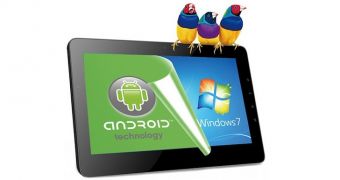New research coming out of Asia indicates Google is fearing dual-OS tablets might be pushing adoption of the Windows 8 operating system, at the expense of Android, so the search giant is no longer backing up such projects.
Back at CES 2014, Intel and ASUS pulled the veil off a dual-OS tablet, capable of running both Android and Windows, called the Transformer Book Duet. Since then, a cast of shadow has fallen over the -mentioned product, which has been removed from online retail locations.
A report coming out of Asia claimed ASUS will be forced to discontinue the device altogether due to pressure coming from Google. The reasons behind the search giant’s decision remain unknown, but DigiTimes pushes forth a theory claiming dual-OS tablet might end up hurting Google in the long run.
The newest information coming from the infamous publications claims ASUS will be postponing the release of the dual-OS tablet, as opposed to discontinuing it. This is in accord with what we have seen yesterday, as two new Transformer Book Duet model with 11.6-inch and 10.1-inch screens have been spotted on the website of design firm red dot 21.
So according to the latest speculations, the Transformer Book Duet might still arrive at some point in the future, in three different screen options. For all we know, ASUS might have only tested the waters with the product this year and may take up production at a later date.
From this dual-OS partnership Intel seems to be benefiting the most. Microsoft isn't on the losing side either, as dual-OS tablets could help it increase adoption of its Windows 8 operating system, which currently has only a meager 3% market penetration.
Google, on the other hand, seems to be the biggest looser, here. It is stipulated, dual-OS devices might prompt adoption of the Windows 8-based machines, at the expense of Android and the search giant doesn't want that.
However, Intel stands only to gain here, as its x86 chips is the only one capable of supporting dual operating system, allowing customers to run both Android and Windows, on a separate basis.
Intel feels that tablets sporting both operating systems will have a positive impact in the business sector. Intel is one of ASUS’ main products in 2014 and is expected to fully back up the computer manufacturer in its endeavor of bringing the Transformer Book Due to the market, but also to provide marketing funding and pricing advantages.
However, Google appears to be striving to keep Android and Windows separate, especially when it comes to tablets boasting larger sized screens. The report concludes by saying other brand vendors have stopped advancing their intentions at building dual OS devices, until further notice.

 14 DAY TRIAL //
14 DAY TRIAL //